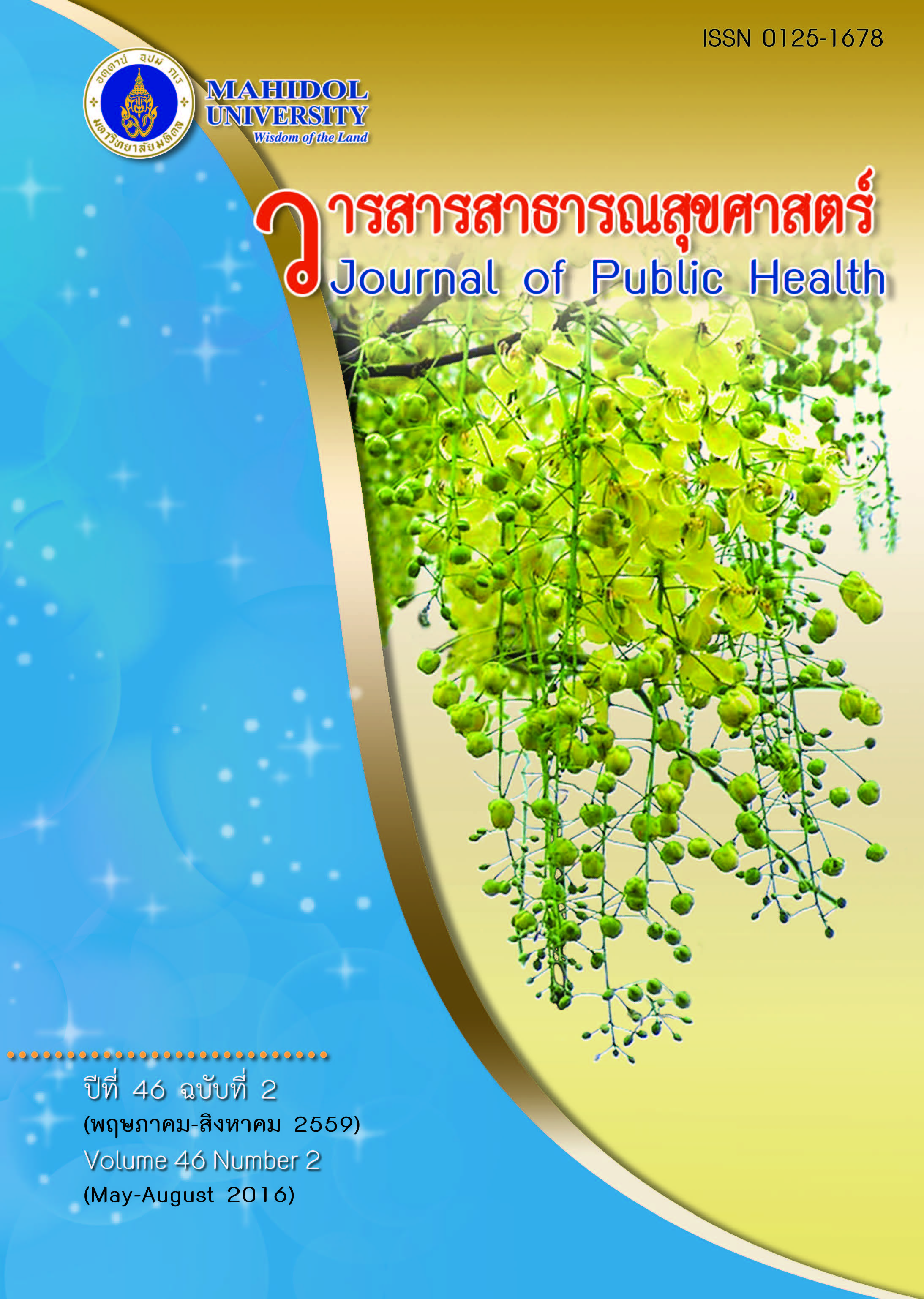ปัจจัยที่มีอิทธิพลต่อคุณภาพชีวิตมารดาวัยรุ่นที่มีบุตรอายุไม่เกิน 6 เดือนในจังหวัดสุพรรณบุรี
Keywords:
คุณภาพชีวิต, มารดาวัยรุ่น, บุตรอายุไม่เกิน 6 เดือน, ลำดับที่ของบุตร, การยอมรับจากเพื่อนและคนในชุมชน, health related quality of life, HQoL, adolescent mother, infant aged less than six months, birth order of the infant, acceptance from peers and communitieAbstract
บทคัดย่อ
การวิจัยเชิงสำรวจแบบภาคตัดขวางนี้ มีวัตถุประสงค์เพื่อศึกษาระดับคุณภาพชีวิตและปัจจัยที่สามารถทำนายคุณภาพชีวิตของมารดาวัยรุ่นที่มีบุตรอายุไม่เกิน 6 เดือน ในจังหวัดสุพรรณบุรี กลุ่มตัวอย่างเป็น มารดาวัยรุ่น 270 คน คัดเลือกด้วยวิธีสุ่มแบบหลายขั้นตอน เก็บข้อมูลโดยใช้แบบสอบถามชนิดตอบด้วยตนเอง ระหว่างวันที่ 22 กรกฎาคม ถึง 30 กันยายน พ.ศ. 2558 วิเคราะห์ข้อมูลโดยใช้ความถี่ ร้อยละ ค่าเฉลี่ย การทดสอบไคสแควร์ และการวิเคราะห์การถดถอยพหุแบบลอจิสติก (Multiple Logistic Regression Analysis) ผลการศึกษา พบว่า มารดาวัยรุ่นมีคุณภาพชีวิตในภาพรวมอยู่ในระดับดี ร้อยละ 37.8 ปัจจัยที่สามารถทำนายคุณภาพชีวิตอย่างมีนัยสำคัญทางสถิติ (p < 0.05) ได้แก่ สถานภาพสมรส ลำดับที่ของบุตร การวางแผนตั้งครรภ์ และการเป็นที่ยอมรับจากเพื่อนและคนในชุมชน ผู้ที่มีคู่สมรส มีคุณภาพชีวิตดีมากกว่า 2.97 เท่าของผู้ที่ไม่มีคู่ (Adjusted OR= 2.975, 95% CI = 1.318 – 6.716) ผู้มีบุตรมากกว่า 1 มีคุณภาพชีวิตดีกว่า 5.13 เท่าของผู้มีบุตรคนแรก (Adjusted OR= 5.136, 95% CI = 1.606 – 16.431) ผู้ที่วางแผนการตั้งครรภ์มีคุณภาพชีวิตดีกว่า 1.96 เท่าของผู้ไม่วางแผน (Adjusted OR= 1.960, 95% CI = 1.038 - 3.702) และผู้ที่ได้รับการยอมรับจากเพื่อนและคนในชุมชน มีคุณภาพชีวิตดีกว่า 5.91 เท่าของผู้ที่ไม่ได้รับการยอมรับ (Adjusted OR= 5.918, 95% CI = 3.317–10.557) ปัจจัยทั้ง 4 ตัวสามารถร่วมทำนายโอกาสที่จะมีคุณภาพชีวิตดีของกลุ่มตัวอย่างได้ถูกต้องร้อยละ 71.9 หน่วยงานที่เกี่ยวข้องควรจัดกิจกรรมโรงเรียนพ่อแม่ในระยะตั้งครรภ์ ติดตามเยี่ยมมารดาหลังคลอด ให้คำแนะนำในการเลี้ยงดูบุตรและให้บริการการวางแผนครอบครัวกับมารดาวัยรุ่นเพื่อป้องกันการตั้งครรภ์ซ้ำ หน่วยงานท้องถิ่นควรจัดกิจกรรมเน้นการมีส่วนร่วมในชุมชนของมารดาวัยรุ่น เพื่อพัฒนาคุณภาพชีวิตของมารดาวัยรุ่นให้ดียิ่งขึ้น
Factors Influencing Health Related Quality of Life among Adolescent Mothers with Infants Aged Less Than Six Months in Suphanburi Provice
ABSTRACT
This cross-sectional survey aimed at identifying level of health related quality of life (HQoL) and its influencing factors among adolescent mothers with infants aged <6 months in Suphanburi Province. Self-administered questionnaires were used among 270 respondents selected from multi-stage random sampling from 22 July to 30 September 2015 and were analyzed by descriptive statistics, Chi-square, and multiple logistic regression. Results revealed 37.8% of respondents had a good level of HQoL. Factors significantly predicted HQoL included marital status, birth order, planned pregnancy, and acceptance from peers and communities. HQoL of the respondents who had a spouse was 2.97 times better than those who did not (Adjusted OR= 2.975, 95% CI = 1.318 – 6.716). HQoL of those who had more than one child was 5.13 times better than those who just had the first child (Adjusted OR= 5.136, 95% CI = 1.606 – 16.431). HQoL of those who had planned pregnancy was 1.96 times better than those who had unplanned (Adjusted OR= 1.960, 95% CI = 1.038 - 3.702). HQoL of those who gained acceptance from peers and communities was 5.91 times better than those who did not (Adjusted OR= 5.918, 95% CI = 3.317–10.557). They were able to predict good HQoL correctly at 71.9%. Responsible organizations should prepare a ‘parenting school’ during pregnancy; provide a home visit during postpartum period to advise on child rearing and provide family planning services to prevent repeated pregnancies. Local authorities should organize an activity to engage adolescent mothers with community members to improve their HQoL.
Downloads
Additional Files
Published
Issue
Section
License
Creative Commons License CC-BY-ND


